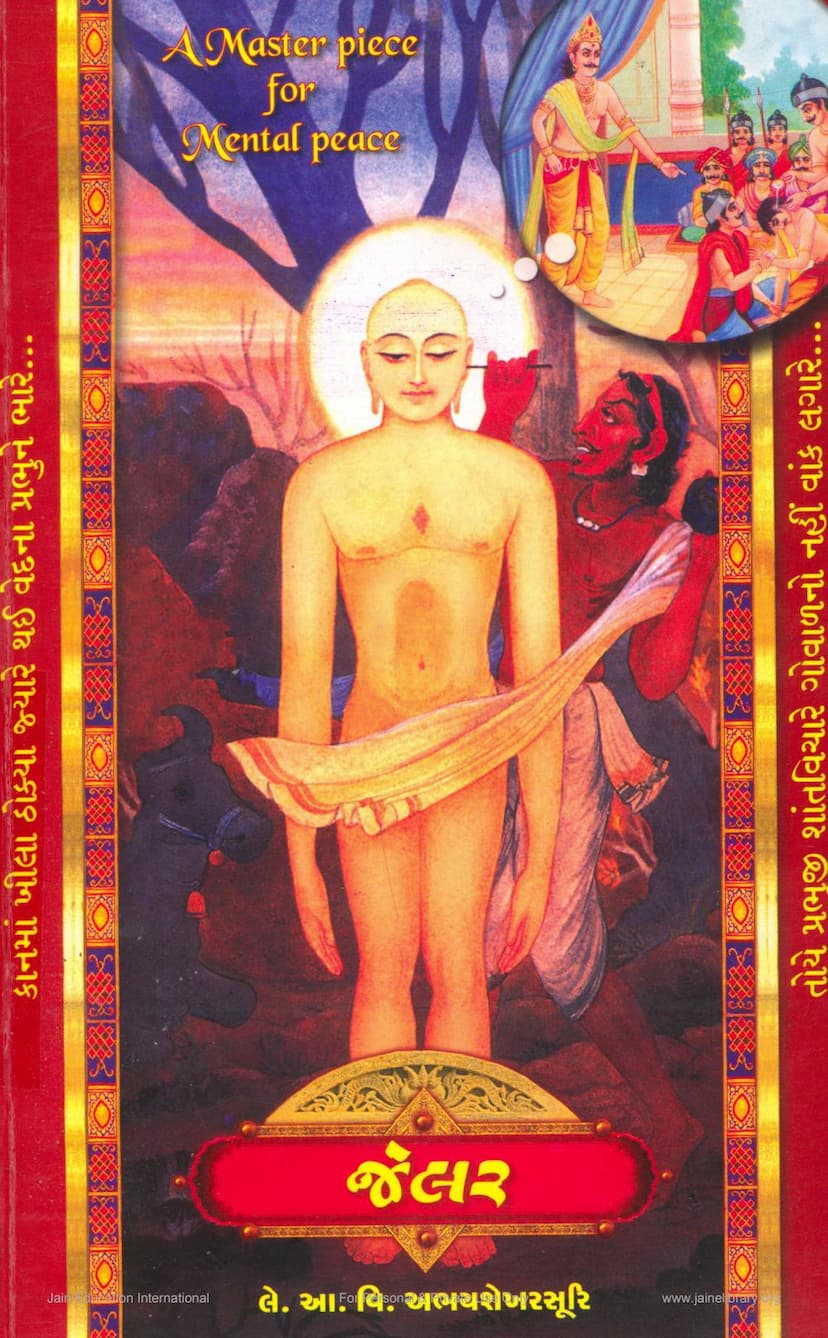Jailer
Added to library: September 1, 2025

Summary
Here's a comprehensive summary of the Jain text "Jailer" by Acharya Vijay Abhayshekharsuri, based on the provided pages:
Book Title: Jailer Author: Acharya Vijay Abhayshekharsuri Publisher: Bhuvane Dharmjaykar Prakashan
Core Philosophy:
The book "Jailer" (જેલર) by Acharya Vijay Abhayshekharsuri presents a profound Jain philosophical perspective on suffering, mental peace, and the karmic laws governing life. The central theme revolves around understanding that external circumstances or individuals causing distress are not inherently evil, but rather act as "jailers" executing the sentences decreed by the "Karma-Satta" (the authority of Karma) as a consequence of our own past actions (apradh/gunha). The key to liberation from suffering lies in recognizing this karmic mechanism and cultivating an attitude of forgiveness, equanimity, and self-reflection rather than blaming others.
Key Concepts and Arguments:
-
The "Jailer" Analogy: The book uses a powerful analogy of a jail. The individual is the prisoner (apradhi/apradhi), Karma is the judge (karma jajj), and those who cause distress are the jailers (jailer). The suffering experienced is a direct consequence of the prisoner's own past wrongdoings.
-
Karma as Justice, Not Malice: The text strongly emphasizes that Karma is a system of justice, not arbitrary punishment. Suffering is never inflicted without a cause. Even seemingly harsh actions by others are merely the instruments of karmic retribution, fulfilling a sentence from a higher court.
-
Shifting Perspective: The fundamental message is to shift one's perspective from seeing external entities as the cause of suffering to understanding that the root cause lies within one's own past actions. This shift is crucial for achieving mental peace.
-
The Power of Self-Reflection (Swabhooldarshan): Instead of blaming others ("my neighbor is bad," "my relative is bad"), the book advocates for introspection ("my actions were bad"). When one begins to see their own past faults, the anger and resentment towards the "jailer" dissipate, leading to inner peace.
-
Equanimity (Samata) as a Shortcut to Self-Welfare: The text highlights that tolerating suffering with equanimity is the fastest path to spiritual progress. It's presented as a shortcut to well-being.
-
The Role of Thought Processes: Mental peace or unrest is not determined by external circumstances but solely by one's thought process. Changing one's perspective and understanding of events can transform suffering into a manageable experience.
-
Examples and Illustrations: The book is rich with numerous examples and stories from Jain scriptures and historical anecdotes (e.g., Agni Sharma, Nagketu, Prabhu Mahavir's experiences, the story of Aghan Kumar) to illustrate these principles. These stories vividly demonstrate how embracing the concept of karma and self-responsibility leads to peace and how blaming others only perpetuates suffering.
-
The Nature of Punishment and Reward: The book explains the principle: "No punishment without an offense, no reward without good deeds" (વિના અપરાધ સજા નહીં, વિના સત્કાર્ય બક્ષિસ નહીં). This is presented as a universal law.
-
Deterrence vs. Transformation: The text argues that external punishment (like that from the legal system) serves as a deterrent, but the true transformation comes from internal understanding of karma.
-
Controlling the Internal Response: The book emphasizes that while we cannot control external events or the actions of "jailers," we have complete control over our internal response. This control lies in cultivating patience, forgiveness, and equanimity.
-
The Importance of Forgiveness and Compassion: The text implicitly and explicitly advocates for forgiveness and compassion, not just for others but also for oneself, by understanding the karmic cycle.
-
Wealth, Health, and Character: The book reiterates the famous saying: "If wealth is lost, nothing is lost. If health is lost, something is lost. If character is lost, everything is lost." It explains that while wealth can be regained and health might be restored in future lives, the degradation of character (through anger, hatred, etc.) leads to more profound and prolonged suffering.
-
The Illusion of External Control: The book dismantles the illusion that others can truly harm us without our own karmic involvement. Any external action that causes suffering is a consequence of our own past karma.
Purpose and Impact:
The book aims to provide individuals with the tools and understanding to:
- Overcome mental unrest and achieve lasting peace.
- Respond to adversity with equanimity and wisdom.
- Break free from the cycle of anger, resentment, and blame.
- Foster a more positive and constructive outlook on life's challenges.
- Understand the underlying principles of Jain philosophy regarding karma and its impact on human experience.
Overall Message:
"Jailer" is a practical guide to achieving inner peace by reframing one's understanding of suffering. It encourages readers to take responsibility for their own destiny, recognize the workings of karma, and cultivate virtues like forgiveness and equanimity. By seeing "jailers" as mere instruments of their own past karma, individuals can transform their perception of hardship, leading to a more peaceful and fulfilling life. The book emphasizes that the ultimate freedom lies not in escaping external circumstances but in mastering one's internal reactions.